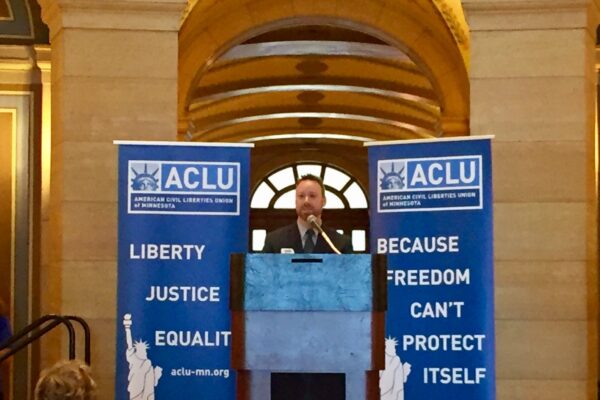We went into the 2017 Minnesota legislative session prepared for a tough year. For the first time in over four years, the House and the Senate are controlled by a majority whose agenda we knew would include significant attacks on civil liberties. The ACLU is a nonpartisan organization and we have successful working relationships with members of all political parties, but the priorities of the state legislature made it clear that we would be on the defensive this year.
Despite these challenges, we were able to secure one important win for due process and criminal justice reform this year! A new law was passed protecting innocent joint-owners when their jointly-owned vehicle is seized due to the other owner’s violation. This is a significant step in addressing Minnesota’s forfeiture laws that punish residents and incentivize policing for profit.
We also pushed back against and defeated some bad bills—including anti-reproductive rights, anti-protesting, and anti-voting rights bills. Many of these provisions were included in omnibus bills, but were either vetoed or removed before being sent to Governor Dayton.
Also, on May 11, dozens of ACLU-MN members and supporters filled the Capitol Rotunda to participate in our 2017 Day at the Capitol. Guest speakers included Secretary of State Steve Simon and a bipartisan mix of state legislators. Our long-time executive director, Charles Samuelson, received a Senate Resolution in honor of his recent retirement. Sponsored by Republican Senator Warren Limmer, the Resolution highlighted the ACLU-MN’s impact on Minnesotans’ civil liberties during Samuelson’s tenure. After the rally, participants had an opportunity to engage their representatives on ACLU-MN priority issues.
We couldn’t have accomplished these major victories without the support of our members and volunteers. With the increase in donations to the ACLU, we were able to add a contract lobbyist for the session, doubling our presence and capacity at the Capitol. In addition, our network of volunteers and supporters throughout the state was bigger, stronger, and more active than ever before.
Here are a few highlights from our work in the 2017 session. Be sure to check out our 2017 legislative "cheat sheet" and read the full report of our legislative activities.
Freedom of Speech and Assembly
- Civil Liability for Protesters (HF 322/SF 679): This bill would force protesters to pay for any costs associated with a protest that was found to be unlawful. Though it passed a House committee on partisan lines, the bill was not given a hearing in the Senate, so it did not move forward in 2017.
- Increased Penalties for Protesters (HF 390/SF 676): This bill would increase penalties for blocking a highway, public transit, or airport access from a misdemeanor to a gross misdemeanor. It passed the House and the Senate as part of the Judiciary and Public Safety Omnibus bill; however, the language was removed at the last minute in negotiations with the Governor.
Separation of Church and State
- Scholarship Tax Credits (HF 386/SF 256): This bill would establish tax credits that act as school vouchers in disguise, effectively allowing public money to go to private and religious schools. The language passed both the House and Senate as part of the first Omnibus Tax bill that was then vetoed by Governor Dayton. In his veto letter, the Governor indicated that he would not sign any bills that included scholarship tax credits.
Voting Rights
- Provisional Ballots (HF 1586/SF 1225): This effort would move Minnesota towards a system of provisional ballots that could increase voter suppression. The language passed the Senate as part of the Elections Omnibus bill, but it did not have any bipartisan support. Accordingly, this controversial language was removed before the elections bill was sent to the Governor.
Reproductive Freedom
- Public Funding Ban (HF 809/SF 702): This bill would prohibit the use of public funds for abortion services in Minnesota. In 1995, the Minnesota Supreme Court ruled in Doe v. Gomez that it was unconstitutional to selectively fund pregnancy and birth-related services while refusing to cover abortion services. Regardless of constitutionality, the bill passed the full House and Senate before it was ultimately vetoed by Governor Dayton.
- Abortion Clinic Licensure (HF 812/SF 705): This bill would create onerous licensure and inspection requirements for certain clinics that perform abortions. This anti-choice bill also passed the full House and Senate, but was vetoed by Governor Dayton.
Criminal Justice Reform
- Civil Asset Forfeiture Reform (Ch. 12/HF 389/SF 151): This new law allows for innocent joint-owners to file a claim in court when their jointly-owned vehicle is seized due to the other owner’s violation of Minnesota’s DWI laws. The ACLU-MN, along with several coalition partners, lobbied in support of this bill for a number of years. While other civil forfeiture reforms are still needed, we believe this law is an important step in the right direction.
Privacy and Technology
- Ignition Interlock GPS Privacy Protection (Ch. 83/HF 179/SF 347): This new law prohibits warrantless GPS location tracking of ignition interlock devices. The ignition interlock program was intended to keep drunk drivers off the road by disabling their vehicles, not as a secret way to track the movements of program participants. The ACLU-MN testified and lobbied in support of this important privacy protection.
While we anticipate many new and returning challenges in the 2018 session, the ACLU-MN will continue to stand strong in the defense of your civil liberties at the Minnesota Capitol.

